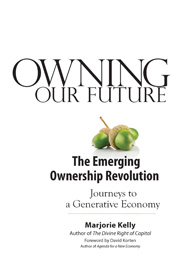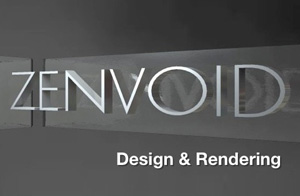 I suspect I’ll give up after a few days, as my memory fades, and my enthusiasm wanes, but, for the foreseeable future, I’d like to keep sharing tidbits that I picked up during the recent BALLE conference, on the subject of strengthening local business ecosystems. Tonight, I’d like to share my notes on the presentation given by Marjorie Kelly, author of the new book, Owning Our Future: The Emerging Ownership Revolution
I suspect I’ll give up after a few days, as my memory fades, and my enthusiasm wanes, but, for the foreseeable future, I’d like to keep sharing tidbits that I picked up during the recent BALLE conference, on the subject of strengthening local business ecosystems. Tonight, I’d like to share my notes on the presentation given by Marjorie Kelly, author of the new book, Owning Our Future: The Emerging Ownership Revolution. When she’s not writing, Marjorie is a Fellow at the Tellus Institute, and Director of Ownership Strategy at Cutting Edge Capital. Prior to serving in those positions, she was Co-Founder and President of “Business Ethics” magazine.
MY NOTES:
Kelly talks of “human scale,” meeting the needs of all people, and the fostering of “joyful human life.” She implies that we could shift society in this direction in a single generation, if we tried. She says that, right now, we’re doing some things well, but that we need to scale them up, building on the work of the visionaries among us, and those who came before. Her new book, she says, is about how we scale, through the implementation of alternative ownership models. She talks of foundation-owned companies, like Novo Nordisk, communally-owned wind farms in Denmark, community-owned banks throughout Europe, and cooperatives spanning from Kenya to New Zealand.
“There is an ownership revolution rising across the world,” she says. She mentions, for instance, that cooperatives, right now, employ more people across the world than all of the multinational corporations combined. The phrase she uses to describe this newly evolving system is the “generative economy.” The fundamental architecture of this economy, she says, is that of fairness and sustainability. The term “generative,” according to Kelly, means “the carrying on of life.” We need to develop a framework, she argues, that allows for the carrying on of life. And that means exploring alternatives for how we own things.
The more of the following five things that you have, she says, the better off you are: Purpose, Rooted Ownership, Mission Controlled Governance, Stakeholder Finance, and Ethical Networks.
She shares the example of the John Lewis Partnership in England. It is the largest department store/grocery store in the UK, she says. Over the employee entrance of each store, she tells us, it says, “Here is partnership at the scale of modern industry.” The company brings in $13 billion dollars in revenue each year, and it’s owned 100% by its employees. Employees elect a partnership council that oversees every aspect of the business. The company employs more people than Monsanto, she notes… I believe she also said that between 40% and 60% of profits are shared with employees… Kelly also mentioned that the company is turning to its customers and employees to fund its expansion. Toward that end, the company just instituted a bond program, through which customers and employees can loan money to the company, and earn a return of 4.5%. As she noted, the John Lewis Partnership isn’t quite what we’d consider a “human scale” business, but it’s rooted in its community, and constantly striving to do better for its employees and the neighborhoods in which it does business.
She mentions community-owned forests in Mexico. Illegal logging and deforestation, she says, drop considerably when land is community-owned, and the community, together, makes decisions as to how resources are cared for, exploited, etc. A huge percentage of forests, according to Kelly, are managed like this, and it’s having a big, positive impact on global warming. But, she says, we’re not hearing about it.
She talks of the lobster industry in Maine. Apparently, only owner-operated boats can be in the water where the lobster breed. Bigger companies have to go father out. The result is, while other ocean species are being over-fished, and populations are depleted, lobsters are doing fine. Owner-operators know better than to overfish, she says. They police one another, and they respect the living system that sustains them. The lobster industry is surviving, says Kelly, because it’s rooted in community.
Behavior, she argues, comes from structure. There are three points in the lifespan of a company that a big structural change could lead to a change in core values. Those points are: the founding, the point where outside capital comes in, and the point where a founder leaves. We need to ensure, she says, that the good companies that we create stay good as they grow. Toward this end, she talks about the practice of allotting “mission shares,” that would allow one to control the mission without controlling ownership. This ensures, she says, that “the soul of the firm is not up for sale.” The Washington Post and Novo Nordisk, she says, have created non-profits to hold “mission shares” for this very reason… So, there are ways to scale up gracefully, and build good, large companies.
Kelly concludes by bringing our attention to BALLE’s vision statement, and telling everyone in the audience, “We aren’t the fringe anymore.”
And, here’s that vision statement:
Within a generation, we envision a global system of human-scale, interconnected local living economies that function in harmony with local ecosystems, meet the basic needs of all people, support just and democratic societies, and foster joyful community life.












3 Comments
If local ownership leads to better forest management, decreasing the rate of deforestation, and slowing the onset of global climate change, why wouldn’t we do everything in our power to see forest land across the globe turned over to the hands of locals?
As I know local librarians read this site, can I request that we get a copy of this book for the downtown branch?
Thanks for posting this important solidarity bridge.
One Trackback
[…] recent BALLE conference in Grand Rapids, which, to a great degree, revolved around the subject of ownership. In this video, Paul Saginaw explains why, ten years after the launch of Zingerman’s […]